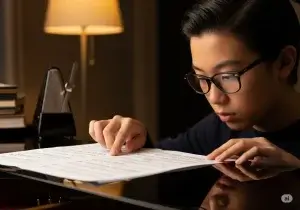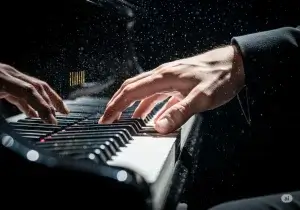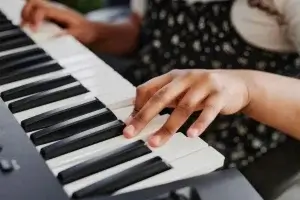Key Takeaways
-
There is indeed no “perfect” age at which to start piano lessons. Instead, consider a child’s readiness in terms of motor skills, attention span, and a sincere desire to play music. These elements, not age alone, are what matters.
-
Left and right identification, counting ability, and instruction taking skills are some of the basics. These skills are vivid signs a child is ripe for piano instruction. The development of these foundational skills, which occur through rich musical experiences, provides the foundation for future success.
-
If you’re thinking about learning piano as an adult, I hope you’ll check it out. The brain’s remarkable ability to rewire itself means we can all learn at any age. Adults tend to be incredibly focused and motivated, with a defined goal in mind when starting a lesson.
-
Creative and developmentally appropriate teaching approaches yield optimal results across all ages. Play-based learning works well for preschoolers, but structured lessons work best with elementary-age children, and adults usually do best with a self-directed learning approach.
-
Keeping them engaged, moving forward, and not burning them out is the magic. Planning achievable practice targets, integrating piano into their daily schedule, and recognizing progress provide valuable support and reinforce a sustained interest over time.
-
Finally, getting into piano at any age provides both emotional relief and developmental advantages. It builds self-confidence, increases brain power, encourages creative expression, and instills self-discipline and patience.
The best age for a child to begin piano lessons is between 6 and 9 years old. At this age, children are perfecting key motor skills and cognitive development to feed their general ability in learning music.
That said, it’s never too early—or late—to start as long you’re able to maintain a steady practice and be open to learning. We are passionate about educating students of all ages.
This is why we pride ourselves on individualized lessons where we understand their individual needs and help them progress at their pace. The bottom line is that there really isn’t an age limit when it comes to learning piano.
What is the Best Age to Start Piano Lessons?
The ideal starting age is different for every kid. It all really depends on all these different variables, as each child matures on their own timetable. Recognizing when a child is truly ready is the best way to set them up for a joyful and enriching piano journey. Here are some important factors to weigh.
1. Assess Basic Motor Skills First
Fine motor skills are essential for playing piano. A child should be able to move their fingers independently and press keys with control. Around age five, many children develop the necessary dexterity to navigate the keyboard.
A four-year-old with strong motor skills might be ready to start. For younger children, simple exercises like finger tapping or clapping patterns can help gauge this readiness.
2. Check Understanding of Left and Right
When playing piano, one of the first challenges is learning to identify the left hand from the right hand. Around age five, most kids know their left from their right without hesitation, which is very important to taking hand-specific directions.
Without this general skill, even introductory lessons can get muddled up.
3. Evaluate Counting Ability
Counting is the mother of all fundamental music skills! A child who can count to at least five and recognize numbers is better prepared to understand rhythms and beats.
This can be tough for younger learners, so reinforcing counting skills in advance of starting lessons can help lessons go more smoothly.
4. Gauge Motivation to Learn
A child’s desire to play piano is usually the main ingredient to their success. If they seem really interested in music already, or love playing around with sounds, they’ll be more likely to stick with it.
It’s no secret that forcing lessons on an uninterested child will ultimately result in feelings of resentment and frustration—from the student, as well as the teacher.
5. Observe Focus and Attention Span
If a piano lesson is only 30 minutes, that’s a long time to expect focused attention! Typically, by the age of five, children begin to create this internal attention span.
Younger children benefit most from play-based shorter sessions. Older students, such as those starting at 10 or 11, are naturally better able to focus.
6. Determine Practice Readiness
Playing piano is all about developing a long-term and habitual exercise routine. A child needs to be able and willing to dedicate time at home to practice what they’ve learned in lessons.
Parents step in significantly at this point, especially in creating a supportive environment that encourages a practice routine without neglecting other activities.
7. Evaluate Instruction Following
Reading music and following directions accordingly becomes a key aspect of learning the piano. If a young student is able to hear and follow basic directions, they are more prepared to listen and learn all this in-depth material.
This is a skill that usually comes when children hit that preschool age.
8. Assess Openness to Feedback
Constructive feedback helps students improve their technique. The child that takes your advice without getting too frustrated will go farther faster.
This quality is something that can usually be nurtured over time with diligence, encouragement and positive instruction from their teacher.
9. Recognize Rhythm Awareness
One of the cornerstones to effective piano playing is rhythm. A young one that is able to clap to the rhythm or copy short rhythmic patterns is ready for learning.
Cultivating rhythm awareness can start well before children ever take lessons, using activities such as singing or dancing.
10. Check Basic Reading Skills
Reading skills do come in handy for learning sheet music, but they’re not required for newbies. By age five, most kids are only starting to learn their letters.
This is why beginning lessons for very young children focus on ear training and simple patterns rather than advanced notation.
Debunking the “Critical Window” Myth
Younger learners do have a significant advantage when it comes to learning piano. This edge is directly tied to their rapidly developing brains during a “critical window” for learning. It’s true that kids benefit from some cognitive flexibilities.
However, this concept greatly underestimates the incredible flexibility of the human brain and the wealth of benefits that come with learning piano no matter what age you are. Exploring the nuances of brain plasticity, the advantages of starting later, and the importance of tailored instruction reveals a more inclusive picture of piano learning.
The Brain’s Lifelong Plasticity
Neuroscience has shown that the brain remains plastic even in adulthood. This allows it tremendous pliability to adapt and reinforce newfound neural pathways, however old you are. This flexibility empowers adult learners to make the piano learning process work for their individual strengths and preferences.
For example, adults typically have more advanced cognitive skills for problem solving and longer attention spans. These traits more than make up for the faster motor learning of children.
Take the example of an adult in their 40s who decides to learn the piano as a new hobby. They have the opportunity to tackle it with a systems-thinking perspective, cascading down big-picture, complicated issues into digestible, aligned pieces. This framework for analysis and continual improvement results in great works of design.
In addition to this, emotional engagement is something that adult learners especially often develop with the music they select, increasing their motivation and dedication.
Benefits of Starting Later in Life
When people do start piano lessons later in life, it’s usually with a clear goal in mind. Adults and seniors frequently choose to learn because they genuinely want to, not because of external pressures. This intrinsic motivation is what can make the learning process so deeply fulfilling.
Additionally, older beginners come with life experiences that add depth to their understanding of music. A simple melody like “Clair de Lune” might carry deeper emotional resonance for a 60-year-old learner compared to a child.
Learning to play the piano provides major brain benefits to older adults. It boosts memory and coordination, a great two-for-one combo that makes it a brain game master.
Tailoring Instruction for Older Beginners
Providing thorough, effective piano instruction to adults and older beginners means catering to their unique needs and expectations. For instance, emphasizing chord-based styles and songs learners already know from the start can help instill confidence and encourage stay-at-home learners.
Visual aids, slower paced lessons, and frequent feedback are all ways to help them succeed. A retired civil engineer learning jazz standards might do beautifully with lessons tailored to improvisation and syncopated rhythms.
Even better, these lessons will be right on target with their musical tastes.
Readiness Factors for Piano Lessons
So when you’re trying to determine the ideal age to take piano lessons, use these main readiness factors as a guide. These questions guide your evaluation of whether or not your child is physically and mentally ready to start their musical journey.
Though the perfect starting age is between 6 – 9 years, readiness is more than age. Here are some of the factors that help ensure a successful beginning.
Hand Size and Development
Hand size factors into piano readiness. From age 5–7, kids’ hands can triple in size. Around this age, they are able to comfortably cover one octave on the piano, a requirement for so many of the beginning pieces.
For less mature pianists, smaller hands can prove to be a significant factor in managing the keys, particularly if they are fully stretching for chords. Fine motor coordination increases dramatically for children between ages 3 to 5 which leads to develop fine muscle control in fingers.
For example, a 6-year-old with the ability to touch all five fingers on adjacent keys is likely ready for basic exercises.
Finger Dexterity Importance
Fingers need to be quick and nimble in order to play even the easiest tunes. By age 5-7, most kids will have the fine motor skills to make their fingers independent from one another.
This independence is important for things like playing scales or finding your notes when you need to use both hands at the same time. If a child can wiggle extension all the way mindful fingers without too much strain, they are probably ready for piano lessons.
Activities such as dough sculpting or working with play tools can develop finger dexterity even more, making learning come easier.
Genuine Interest in Music
Above all else, a child’s enthusiasm for music is the most definitive determinant of readiness. When a child is truly interested in learning, they’re more likely to stay focused and dedicated in practice.
Signs of interest might include tapping rhythms on tables, singing along to songs, or showing curiosity about how instruments work. For instance, a child who eagerly approaches a keyboard and experiments with sounds is more likely to engage actively in lessons.
Cognitive Development Milestones
Cognitive readiness is just as essential. Usually, by the ages of kindergarten or first grade, children are able to start discerning patterns, multi-step directions and doing basic music notation reading.
These skills usually develop in children from ages 5 to 7, which coincides with the ideal starting age for piano. Lessons require a minimum of 30 minutes of undivided concentration.
As children’s attention spans develop during this period, making them feel engaged is much simpler. Beginners 10 years and older may equally experience success with adapted teaching strategies that meet their increased maturity and understanding.
Tailored Teaching Methods by Age
Determining the ideal age to begin piano lessons means looking at how age-related teaching approaches can facilitate a student’s development. Each developmental stage has its own assets and liabilities, influencing how the lessons are tailored to help students grow musically.
Preschoolers: Play-Based Learning
For kids under six, our piano classes help students learn how to develop an appreciation for music while creating a fun, inviting environment. During this age period, fine motor skills and hand independence are in a period of growth and development, making more formal lessons difficult.
Instead, activities like clapping rhythms, exploring high and low notes, and singing along to simple melodies help build a foundation. Their attention span is much shorter – about 10-15 minutes max.
To keep your students engaged, bring musical games and storytelling into virtual lessons! Small preschoolers may not be able to play full songs yet, but they should still play around and start their exploration on the piano. This early exposure typically ignites curiosity and cultivates a lifelong passion for music.
Elementary: Structured Lessons
Some music teachers believe that children between the ages of 5 to 9 are the best candidates for starting piano lessons. By this age, fine motor coordination has greatly developed, allowing them to easily play one octave on the piano.
Their hands and fingers become increasingly dexterous and autonomous. This is the one skill they need when learning the basics such as scales and chords. Starting to teach them to develop their reading capabilities enables them to begin studying the notation of sheet music, again connecting the dots between theory and practice.
For the first time, they are capable of sustained focus for 30-minute increments. This provides them with an opportunity to participate in focused classes that combine skill-building with fun music.
With P2P, parents can schedule weekly lessons for their kids. These lessons often range from $40 to $90 CAD for a half-hour, based on the instructor’s specialty. It’s an investment that most frequently returns with deeply rooted musical understandings and consistent growth.
Teens: Goal-Oriented Approach
Teenagers definitely have a different, fun energy to them when it comes to taking piano lessons, right? To be successful, they need a specific piece or concert, and they do better when they know they’re working toward something.
Their improved cognitive understanding of abstract ideas, combined with a richer emotional communication, means they’re ready to tackle more difficult and higher level music. Music teachers can use these genres—like jazz or pop—to connect with students’ interests, without abandoning the fundamentals of classical technique.
Adults: Self-Directed Learning
In fact, lessons for adults tend to be more focused on self-motivation and personal goals. For adults, the key is flexibility and customized instruction that aligns with their interests.
Whether it’s learning how to play their favorite songs or exploring the universe of music theory, their age and maturity lend itself to independent, self-directed practice and a real understanding of and reflection on the music that they’re studying.
Maintaining Interest and Commitment
Getting into piano lessons at a young age can turn into an exciting and enriching lifelong experience. Sustaining that interest and commitment requires a bit more intentionality. An engaging and predictable routine fosters excitement and enthusiasm for learning students and helps cause children let go and trust!
It enables them to build a lifelong relationship with music.
Balance Piano with Other Activities
Keeping piano practice in harmony with the rest of life is key to lasting engagement. Today’s kids are busier than ever as they balance academics, after school activities and quality time with family. When they make practice fit into their day, piano feels more like a regular life rhythm.
It changes from a dreaded task into something fun that you look forward to. For example, a 5-year-old beginning lessons should ideally be practicing 10 to 15 minutes a day. This hands-on method is much more productive than sitting through an endless half-hour lecture.
This method helps keep them engaged and committed and gives them time to pursue other passions or hobbies. A knowledgeable instructor will typically segment practice time into shorter, achievable intervals in order to hold the attention of the burgeoning students.
Prevent Burnout and Frustration
People become burned out and frustrated when the expectations are unrealistic or when they perceive the progress as slow. We need to keep in mind that piano skills build over time and are not magically acquired overnight. For so many kids, it can be years before they figure out how much they love to play.
Get them to commit to sticking with lessons for a minimum of two years. This investment provides them the space to discover their greatest possibilities. Parents have a tremendous impact on helping to foster that environment.
They can help engage the whole family in creating an environment that promotes a regular practice routine.
Set Realistic Practice Goals
Whatever your plans for young learners—setting achievable goals and having a clear vision are vital. For example, mastering playing even a basic tune perfectly at a slow tempo before gradually picking up is an empowering skill-building activity. Teachers who prioritize this learned, step-by-step framework teach students to walk before they are rushed to run.
For most children, starting lessons around the age of 5 or 6, even if they aren’t initially eager, provides a good foundation. Around this time, kids awaken to the usefulness of learning music. In some cases, older kids exhibit more patience than their younger peers.
Celebrate Small Achievements
Finding and celebrating small victories helps maintain interest and commitment. Be it learning a new song or developing the ability to play with both hands, these experiences foster assurance and eagerness.
Whether it’s a sticker chart or a family recital, celebrating accomplishments can help students’ feelings of progress feel more real and rewarding.
Emotional and Developmental Benefits
Enrolling in piano lessons from an early age lays the foundation for healthy emotional and developmental benefits. These benefits extend past just musical talent, nurturing essential development areas such as confidence, cognitive development, self-discipline, and creativity.
Boost Confidence and Self-Esteem
Children who learn to play the piano learn to reach milestones and then exceed them, creating confidence along the way. There’s no greater pride than just having played a part in conquering a tough compose. This achievement further inspires confidence in your power and skill.
This is a huge accomplishment for a child who just learned their first melody after weeks of hard work. This accomplishment validates their hard work and builds their confidence. Inevitably, this involves performances—these can be informal family showcases or more formal small group or large group performances.
This achievement increases their confidence and makes them more confident in their competence.
Enhance Cognitive Abilities
As an added bonus, piano lessons are like a workout for the brain, enhancing memory, problem-solving skills, and listening comprehension. Research indicates that musical literacy through reading sheet music typically starts in low elementary—such as in kindergarten or first grade.
This early exposure lays the groundwork for their future reading success. Reading music and working with both hands at once stimulates both hemispheres of the brain, which increases retention of information and processing speed.
A student starting piano instruction at 5-7 years of age demonstrates significant advantages in their ability to concentrate. They can focus on a single task for extended periods — often half an hour or more in a single stretch.
This improved attention span and the ability to multitask, such as reading music while coordinating hand movements, are skills that can benefit them in other academic and social areas.
Develop Discipline and Patience
Piano lessons provide discipline, as a student learns to sit down and practice regularly. Young learners also learn patience, practicing their technique and overcoming difficult passages in music.
These habits of perseverance can move beyond music, creating a sense of responsibility in schoolwork and other aspects of life as well. A kid who hones her scales learns deep discipline.
That same willpower is apparent when it comes to crunching numbers on a math quiz or math homework.
Foster Creativity and Expression
Music is a key, liberating form of self-expression. With the support of piano, children will be able to discover and express their feelings while developing their creative ideas improvising or writing their own music.
This opportunity to create fosters an early and lifelong love for music, as well as emotional development. A child playing a piece by Chopin, for instance, connects with the music on a deeper level, expressing feelings through every note and dynamic.
Can You Start Piano Late?
So, starting piano as an adult is not just possible, it’s usually a wonderful experience. We know that starting a musical journey later in life can be pretty daunting. Though challenging at times, the experience can be very rewarding and enriching, as adult learners come with invaluable strengths that create unique learning experiences.
Read on as we discuss common worries and share tips for success in adulthood piano study.
Advantages of Adult Piano Lessons
For adult learners, life experience is an asset that usually results in more meaningful connections to music. All of us have already been a couple of years engrossed within music — whether attending concerts, engaging with artist buddies. This breadth of exposure enables us to find the styles and pieces we love, which is a source of inspiration and a goal-oriented focus that can be invaluable.
It’s true that children depend on adults to navigate their learning. By comparison, adults embrace responsibility for their learning experience, growing more self-directed and results-oriented.
In addition, adults tend to understand abstract concepts such as music theory much faster. Regular short and focused practice sessions increases your rate of progress tremendously. You’ll be amazed by what you can achieve with only 20 to 30 minutes a few times a week!
With focused practice, we can all improve at a regular pace and start achieving a satisfying level of play sooner than you’d think.
Overcoming Perceived Limitations
One huge myth is that you can only learn piano if you start when you’re young. As nice as that might sound, early exposure is not a requirement for success. Dedication and consistent effort will always be the better path over age when it comes to mastering the piano.
Many famous pianists, including Billy Joel and Herbie Hancock, began serious training later in life, proving that age is no barrier. Perhaps the biggest hurdle to overcome for adult learners is expectation.
It’s totally natural to feel frustrated when progress feels like it’s at a standstill. Just keep in mind that anything worthwhile takes practice! Making that foundation in piano solid isn’t an overnight affair, just like making sure a house is built on a strong foundation takes time.
Instead of looking for instant gratification, we should enjoy the ride and take pride in progress at each step.
Setting Achievable Goals for Adults
Setting realistic goals and checking in with progress is key. Unfortunately, adults tend to want to do in two years what it would take a child prodigy six years to achieve. This achievement is attainable, but it requires a strategic approach.
By creating defined goals with smaller, realistic milestones, we build momentum with each step without feeling crushed by the mountain ahead. Completing even one easy piece provides a wonderful feeling of achievement.
It increases your motivation to continue developing your hand coordination.







